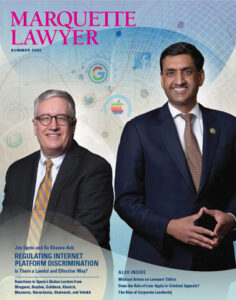Milwaukee Police Chief Asks the Public: “Our Hand Is Out. Meet Us Halfway.”
We’re all in this together. If we want a safer Milwaukee, we need people to come together to trust law enforcement, to build healthy connections in neighborhoods, to provide help to those who might otherwise be headed for trouble. Law enforcement can’t do it alone.
That was the broad message from the Milwaukee area’s two top law enforcement leaders during an “On the Issues” program Thursday, June 1, 2023, at Eckstein Hall.
The most powerful statement of the theme came from Milwaukee Police Chief Jeffrey Norman. Derek Mosley, director of the Law School’s Lubar Center for Public Policy Research and Civic Education and moderator of the program, asked Norman and Milwaukee County Sheriff Denita Ball what they consider the most pressing need of the departments they lead.
“I’ve said it time and time again: It’s trust. It’s trust that we are doing the right things for the right reasons for you all,” Norman responded, gesturing to the audience of about 200.
Norman, who was named acting chief in 2020 and given the full title in 2021, urged people to leave behind past problems with some of his predecessors. Holding on to the past hampers moving forward, and the department has changed, he said.
“We have a different culture in the Milwaukee Police Department,” he said. “Believe me. Accountability is real. But we have a lot of great men and women doing work to keep our community safe. And I stand on that.
“It’s important for all of you to know that this is a different department. It’s a different department. Give us that benefit of the doubt. It’s a partnership. It’s not a one-way vehicle here. We can’t get to reckless driving, we can’t get to violent crime, we can’t get to the things that are going on in our neighborhoods if we do not trust each other.
“Our hand is out. Meet us halfway.” He held out his hand as he spoke.
Ball jokingly responded to Norman’s impassioned call by saying, “All right, rev.”
She agreed that trust is important. But she said staffing is the biggest challenge for the sheriff’s department, with need for both more deputies to patrol freeways, parks, and the airport and more people to work in the Milwaukee County Jail, which she oversees.
Norman, who is a 2002 graduate of Marquette Law School, also said staffing is a continuing issue for the police department.
Earlier in the program, Mosley referred to the killings at the Christmas parade in Waukesha in 2021 and at a Fourth of July parade in Highland Park, Ill., in 2022. He asked if tragedies such as those affected preparations for large events in Milwaukee this summer.
Norman said law enforcement plans for what can be done to minimize chances of such crises, including more use of physical barriers, more visible presence of officers, and more work with community groups ahead of and during events. But, he said, events such as the killings in Highland Park by someone who was in a building overlooking the parade can be hard to prevent.
Emphasizing the theme of partnering with the community, he said a big part of what can be done is information and help from citizens. “It’s you all,“ he said. The slogan , “If you see something, say something,” is important, he said. Tips from citizens are valuable.
Ball said the sheriff’s department has built up its relationships with the 19 municipal police departments in Milwaukee County and with other law enforcement agencies. “We are better together,” she said.
Norman said collaboration among agencies was valuable and can increase effectiveness. As he put it, “You’ve got the peanut butter, I’ve got the jelly, let’s make a sandwich.”
The two took several questions and comments from the audience. One person asked how police judge whether to react strongly or stand back when there is major disorder. Norman responded, “I’m not going to allow death and destruction on my watch.”
To watch video of the program, click here.

 Nearly everybody uses the internet every day and, for many us, all day long. It is ubiquitous and, looked at from a long-term perspective, an amazing part of our lives. It is also far from perfect. Can it be made better?
Nearly everybody uses the internet every day and, for many us, all day long. It is ubiquitous and, looked at from a long-term perspective, an amazing part of our lives. It is also far from perfect. Can it be made better?